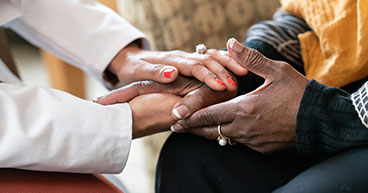
Talking about death and end-of-life planning are often uncomfortable conversations for anyone. But thinking through those plans and having the difficult conversations now can actually relieve your anxiety as well as that of family members and friends.
“You know what? We’re all going to die,” says Rev. Jeffrey Paparone, chaplain at City of Hope® Cancer Center Phoenix. “I don’t use euphemisms—pass away, expire. Milk expires. People die.”
Rev. Paparone not only guides patients through the spiritual aspects of end-of-life planning; he helps them complete the necessary legal documents.
“There are some cultural nuances as well,” he says. Certain cultures hold that “if you talk about cancer or end of life then it’s going to bring it about, and that’s just simply not the case,” he says.
Rev. Paparone understands the reluctance many people have in discussing end-of-life wishes, whether out of fear, denial or simply not making it a priority in their life. While everyone’s approach is different and unique, he says he regularly sees the relief once the discussion has been had and the documents signed.
“It’s important to have that difficult conversation…when it’s completed, it’s a gift,” he says.
This article will help you:
- Plan with emotional, spiritual, logistical concerns in mind
- Create legal documents
- Consider palliative care
- Manage stress
If you have been diagnosed with cancer and are interested in getting a second opinion about your diagnosis or treatment options, call us or chat online with a member of our team.
Plan with emotional, spiritual, logistical concerns in mind
Rev. Paparone encourages everyone to contemplate what they would like their end of life to look like and to legally document their wishes.
“Whether you’re stage 0 —haven’t been diagnosed—stage 1, stage 4, it doesn’t matter,” he says.
He remembers when he and his wife completed their advanced health care directives, and friends and family asked them if everything was OK or if one of them was sick.
“The norm is to think, ‘I’m not sick yet, why would you even think about that?’” he says.
It may feel like it’s never an ideal time to plan for the end of life and beyond, but it’s important to make time, Rev. Paparone says. Make an appointment to speak to a religious or spiritual leader with whom you may already have a relationship who can guide you. Civic organizations may also help, Rev. Paparone advises, adding it’s easier to discuss before you are dealing with the stress, uncertainty and possible physical symptoms of cancer—or another—diagnosis.
If you have been diagnosed with cancer, you may be asked during in the intake if you have completed the forms documenting your end-of-life wishes. If not, it may be suggested you make what Rev. Paparone terms a “divine appointment,” with a chaplain or administrator to help you complete the forms so they can be added to your health record.
“What I usually do, and what I encourage our pastoral care team to do, is to get to know the patient first because then those difficult conversations may become a bit easier,” Rev. Paparone says. “I like to listen to their heart first and we can get to the end-of-life business later.”
End-of-life discussions, also known as advance care planning, are a key aspect of quality oncology care, according to a 2018 article published in Seminars in Oncology Nursing, which says such “discussions for patients with cancer are dynamic, complex, and unique to each individual’s medical condition and values. Patients must be prompted and supported as they receive disease-directed therapies to express their care goals and make decisions for their future care that are congruent with their wishes. These conversations may evolve over time and represent a balance between patient autonomy and the input and guidance from caregivers and health care teams.”
Part of the equation is having robust and open dialogue.
“Honestly, 95 percent of the time when a person is diagnosed or re-diagnosed—the cancer has come back—the person’s first thought is ‘I’m going to die.’ So, they’ve thought about it and most patients want to talk about it,” says Rev. Paparone. “But they don’t want to talk about it with family because they think ‘if I talk about it with family I’m going to worry them more.’ I tell them they’re thinking about it too. And the minute they can come together and process it together all anxiety, all fear it just dissipates.”
Not planning for the end of life now may cause upheaval in the family later, as Rev. Paparone has witnessed.
“When people choose not to complete end-of-life documents you may get some warring back and forth among family over what the loved one wanted at the end of their life. You can feel the tension,” Rev. Paparone says. “On the other hand, when they get the documents done, in general, what they tell me is ‘I’m so thankful that it’s done.’”
Create legal documents
The three essential health care end-of-life legal documents Rev. Paparone recommends are:
- Mental health care power of attorney (POA)
- Health care POA
- A living will
An attorney can help draw up these legal documents for you or you can download the necessary forms and have them notarized by a notary public. Rev. Paparone is a notary and helps patients complete the process.
You may find the necessary documents and the legal requirements for your state your state’s attorney general’s website. AARP offers a helpful guide of advance directive forms for each state.
Below are the basics of what each of the forms includes.
Health care POA or durable health care POA
This document requires you to select someone to make your health care decisions for you if you no longer are able to do so.
This person will have access to your medical information and will have the legal right to make decisions about your treatments when you are no longer able to. Be clear with this person what your wishes are if you are unable to speak for yourself on matters regarding continuing treatment as well as withholding or withdrawal of life-prolonging measures including artificial nutrition and hydration. Some states also include provisions around organ donation on the form.
In an emergency, if the person you have delegated health care decision-making responsibilities to is not immediately available, it is recommended you also have a Physician Orders for Life-Sustaining Treatment (POLST) form and, if desired, a do-not-resuscitate order (DNR) on file in your medical record. This will allow the health care providers caring for you in an emergency situation to know your wishes. These forms are also available online and usually must be signed by your physician and or notarized.
All of these forms can be revised if you change your mind about any of your decisions.
Mental Health Care POA
This is similar to the Health Care POA and some states combine them on one form. Mental Health Care POA focuses on assigning someone to make mental health decisions including on medications or treatments on your behalf if you are no longer able to.
Living will
This document may incorporate what is already set out in your Health Care POA and Mental Health Care POA and other end-of-life considerations like receiving pain medication. A living will may include your wishes about where you would like to die, organ donation or whether you would like to be buried or cremated.
The instructions on the form can help guide you, but sign it before a notary, Rev. Paparone says. He and his team can also help patients process their thoughts.
“We talk about death; we talk about dying and what does it mean for your family when you go through that dying process. What do you want that atmosphere to look like? It’s usually, ‘I want to die at home; I want to die without pain.’ Families can take a hold of that because no one wants to see someone in pain,” he says.
Consider palliative care
Palliative care seeks to improve quality of life, including relieving pain or other symptoms that may come with having a serious illness like cancer.
A patient may receive palliative care at any time or any stage of their disease for a period of time and discontinue it when symptoms have abated.
Palliative care is different from hospice care, which is for those at the end stages of their disease when treatment is no longer of benefit. Hospice care aims to make the end of life as comfortable as possible and to honor a person’s end-of-life wishes.
Manage stress
To help manage the stress that often accompanies a cancer diagnosis and the rigors of treatment, experts offer several tips that may be helpful. They include those listed below.
- Speak to a mental health professional about stress management.
- Maintain a good sleep schedule.
- Eat well and consult with a dietitian if your treatment or side effects are having an impact on your diet.
- Share your feelings with trusted and supportive family members and friends.
- Get outside to enjoy nature.
- Exercise as much as possible.
- Think through your end-of-life wishes and complete the necessary documents. Rev. Paparone says doing so will help relieve stress on you and your family.
The American Cancer Society offers a comprehensive guide to what to expect at the end-of-life and how patients and caregivers may prepare.
The ACS recommends patients share with loved ones where you would like to die, who you would like present and the general atmosphere you would like to foster.
“You may also want to find peace in important relationships,” the ACS documents says. “This may include resolving conflicts, saying goodbye to special people, and telling family members how much you love them. If you cannot or prefer not to talk in person, consider writing, calling, video chatting, or sending a message through a family member.”
If you have been diagnosed with cancer and are interested in getting a second opinion about your diagnosis or treatment options, call us or chat online with a member of our team.



